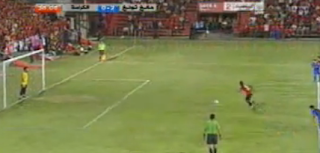
Check out
UEFA’s video explaining the experiment with additional assistant referees (or extra assistant referees,
EARs).
5 Referees
More Vision
More Communication
More Information
Now We See More
Respect the Referees
Respect the Game
Despite this
glitzy publicity spot, aired on giant screens at stadiums throughout Europe,
HKRef wonders whether:
1) there are
5 or 6 match officials?2) “more vision, communication and information” is having the desired effect.
3) this campaign for
more respect will be undermined by missed incidents (example given below)
Are EARs the extra eyes needed in football?
As a match official,
HKRef understands that any official appointment bestowed at the highest level is an honour and a privilege. Referees are human too and take great pride and encouragement when they are appointed and given responsibilities to officiate the best matches. This is why
HKRef is mindful of the dilemma in criticizing the usefulness of
extra assistant referees (EARs). It will be difficult to get unbiased feedback from match officials about the usefulness of EARs.
As match officials, we want to receive as many appointments as possible at the highest level (it is somewhat akin to players receiving “caps” when selected to play for their national teams). But
as neutral observers, we want to know that the system works and that EARs are not just there for decorative purposes or to help UEFA, FIFA and IFAB fend off supporters of goal-line technology and video refereeing.
The question then is:
“Are EARs effective?” Are additional assistant referees fulfilling the aims that they were designed for? What are these aims? Well,
UEFA, FIFA and IFAB told the world that:
Having an extra pair of eyes monitoring play in each area had a preventive effect and promoted better decision making on suspected fouls. Players were less prone to shirt-pulling at corners and free kicks, diving in the area and dissent.
This message was recently
reiterated by UEFA:
Their [additional assistant referees] particular brief is to focus on incidents that take place in the penalty area, such as holding or pushing at set-piece situations. The deployment of additional assistant referees is also seen to have a deterrent effect, as players will be aware that they are being closely watched.
HKRef has previously questioned how this “preventive effect” can actually be measured. And measured as objectively and as scientifically as possible. So far, the authorities have not disclosed any details of how they assess the effectiveness of using EARs. Until details and data are fully disclosed, HKRef
does NOT consider the use of EARs or additional assistant referees to be a proper trial or experiment that will yield valid results.
Here is an example, one of many, illustrating that EARs do not have a “preventive or deterrent effect” on players. The following incident occurred during the
AC Milan and Auxerre Champions League group match on Wednesday 15 September 2010. The match ended 2—0.







 [AC Milan’s Gianluca Zambrotta (red#19) pushes Auxerre’s Steeven Langil (blue#21) in the back and right in front of the extra assistant referee (EAR). But nothing was given by the Romanian match officials.]
[AC Milan’s Gianluca Zambrotta (red#19) pushes Auxerre’s Steeven Langil (blue#21) in the back and right in front of the extra assistant referee (EAR). But nothing was given by the Romanian match officials.]
Q:
Did the presence of an extra assistant referee (EAR) positioned at the goal line have a deterrent effect? NO.
Q:
Did the “extra pair of eyes” assist the match referee in deciding that there was a foul (i.e. push in the back) or that there was simulation? NO.
In
UEFA’s publicity campaign, UEFA chief refereeing officer Pierluigi Collina, says:
“Now we see more”Really? Is that so?
AC Milan’s Zambrotta is clearly laughing at that statement.
As mentioned previously,
HKRef may publish preliminary statistics of UEFA’s trial of using EARs. If anyone would like to collaborate on this, please contact
HKRef.



 [Steven Gerrard (red #8) leads with his elbow and makes contact with Danny Welbeck's face (white #17). Gerrard also missed the ball.]
[Steven Gerrard (red #8) leads with his elbow and makes contact with Danny Welbeck's face (white #17). Gerrard also missed the ball.]


























